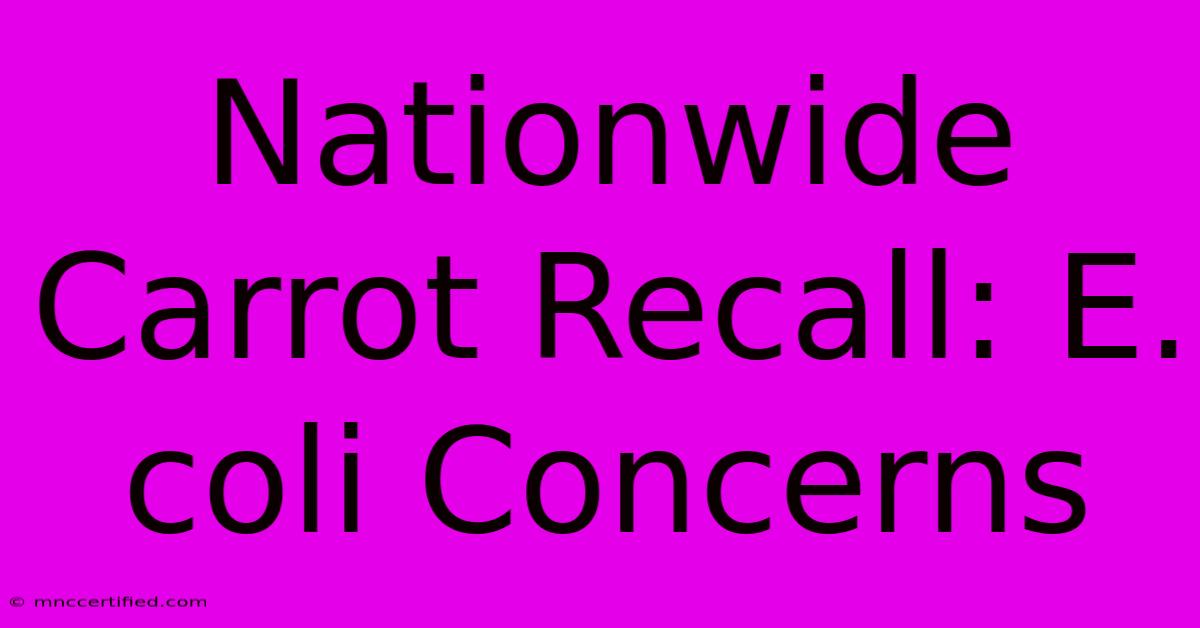Nationwide Carrot Recall: E. Coli Concerns

Table of Contents
Nationwide Carrot Recall: E. coli Concerns
A nationwide recall of carrots has been issued due to potential E. coli contamination, sparking concerns among consumers. This article will delve into the details of the recall, explain the risks associated with E. coli infection, and provide guidance on how to protect yourself and your family.
Understanding the Carrot Recall
The recall, announced by [Insert Name of Company/Organization Issuing Recall Here], affects [Specify type of carrots, e.g., baby carrots, whole carrots, etc.] packaged between [Date Range]. The affected products will have a specific product code or lot number, which can be found [State where the code can be found, e.g., on the packaging label]. It is crucial to check your carrots immediately if you purchased them within the specified timeframe.
The recall was initiated after [Explain the reason for the recall, e.g., routine testing, consumer reports, etc.] revealed the presence of E. coli bacteria in some batches. [Insert Company/Organization Statement if Available]. This isn't the first time a vegetable recall has occurred; in recent years, we've seen similar situations highlighting the importance of food safety protocols and stringent quality checks throughout the supply chain.
Identifying Recalled Carrots
To ensure you are not consuming affected carrots, carefully check the packaging for:
- Product Name: [List the specific product names included in the recall]
- Lot Number/Code: [List the specific lot numbers/codes to look out for]
- Best-Before/Use-By Date: [Specify the date range]
If your carrots match these details, do not consume them.
The Dangers of E. coli Contamination
Escherichia coli (E. coli) is a type of bacteria that can cause serious illness. While many strains are harmless, some, like E. coli O157:H7, produce toxins that can lead to severe symptoms, including:
- Diarrhea (often bloody): This is a common and significant symptom.
- Stomach cramps: Severe abdominal pain is frequently reported.
- Vomiting: This can lead to dehydration if severe.
- Fever: While not always present, fever can indicate a more serious infection.
- Hemolytic Uremic Syndrome (HUS): In severe cases, E. coli infection can lead to HUS, a type of kidney failure, particularly dangerous for young children and the elderly.
If you experience any of these symptoms after consuming carrots, seek immediate medical attention. Early diagnosis and treatment are crucial to preventing serious complications.
What to Do if You Have Recalled Carrots
If you have purchased carrots that are part of the recall, follow these steps:
- Do not eat them. Immediately discard the carrots in a sealed bag to prevent cross-contamination.
- Thoroughly clean any surfaces: Clean any surfaces the carrots may have touched, such as countertops, cutting boards, and utensils, with hot, soapy water.
- Contact the retailer: Check your receipt and contact the retailer where you purchased the carrots to inquire about a refund or replacement.
- Report any illness: If you experience symptoms after consuming the carrots, contact your doctor and report the potential E. coli exposure.
Preventing Future E. coli Contamination
While this recall highlights the importance of food safety protocols within the industry, there are steps consumers can take to mitigate the risk of foodborne illnesses:
- Wash your produce thoroughly: Always wash fruits and vegetables, including carrots, before consumption, regardless of whether they are pre-packaged or not.
- Cook food to the correct temperature: Ensure that meat and other potentially hazardous foods are cooked to the appropriate internal temperature to kill any harmful bacteria.
- Practice good hygiene: Wash your hands thoroughly before and after handling food.
This nationwide carrot recall serves as a reminder of the importance of food safety awareness. By following these guidelines and staying informed about product recalls, you can protect yourself and your family from potential foodborne illnesses. Remember to check the official recall information regularly for updates and further details.
Keywords: Nationwide carrot recall, E. coli contamination, food safety, food recall, carrot recall 2024, E. coli symptoms, food poisoning, vegetable recall, foodborne illness, consumer safety, food hygiene, recall alert.

Thank you for visiting our website wich cover about Nationwide Carrot Recall: E. Coli Concerns. We hope the information provided has been useful to you. Feel free to contact us if you have any questions or need further assistance. See you next time and dont miss to bookmark.
Featured Posts
-
Kinghorn Insurance Hilton Head Sc
Nov 19, 2024
-
Smci Stock Jumps Nasdaq Listing Secured
Nov 19, 2024
-
Poland Vs Scotland Live Stream Free
Nov 19, 2024
-
Top Gifts For Buffalo Bills Fans
Nov 19, 2024
-
Chelsea Pride Condemning Abuse Against Sam Kerr
Nov 19, 2024